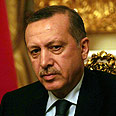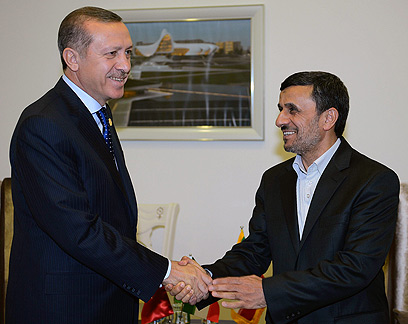
Watchdog: Turkey treats journalists worse than Iran
US-based Committee to Protect Journalists says around two-thirds of detained reporters were writing about largely Kurdish southeast; criticizes PM Erdogan's public disparagement of journalists
Turkish Prime Minister Tayyip Erdogan's government has waged one of the world's biggest crackdowns on press freedom in recent years, jailing more journalists than Iran, China or Eritrea, a leading media watchdog said on Monday.
The damning report from the Committee to Protect Journalists (CPJ) added to a chorus of criticism from the European Union and rights groups of the EU-candidate country's mass detention of reporters, most of whom are kept in detention while their cases are dealt with.
Around two-thirds were journalists writing about the largely Kurdish southeast, where the government is fighting a separatist rebellion.
The US-based watchdog criticized Erdogan's public disparagement of journalists, the use of pressure tactics to encourage self-censorship, and the launching of thousands of criminal cases against reporters on charges such as "denigrating Turkishness."
Related articles:
- Op-ed: Erdogan's long-term plan
- Report: PM hoping to restore relations with Turkey
- Turkey to boost Holocaust studies?
"Turkey's press freedom situation has reached a crisis point," the watchdog said in a 50-page report.
"The CPJ has found highly repressive laws ... a criminal procedure code that greatly favors the state; and a harsh anti-press tone set at the highest levels of government," it said.
Erdogan was first elected a decade ago with an overwhelming majority and has presided over a period of unprecedented prosperity, winning him admirers among Western nations keen to portray Turkey as an example in a troubled region.
But that success story has been undermined by growing criticism of the authoritarian style of his rule.
Hundreds of politicians, academics and journalists are in jail on charges of plotting against the government, while more than 300 army officers were convicted last month of conspiring against Erdogan almost a decade ago, and handed long jail terms.
Erdogan's government says most of the detainees are being held for serious crimes, such as membership of an armed terrorist organization, that have nothing to do with journalism.

'Denigrating Turkishness.' Erdogan (L) with Iran's Ahmadinejad (Photo: AP)
"Turkey is making an effort to strike the right balance between preventing the praising of violence and terrorist propaganda, and the need to expand freedom of speech," the CPJ quoted Justice Minister Sadullah Ergin as saying.
The CPJ identified 76 journalists being held in jail as of August 1, and said at least 61 had been detained in relation to their published work or news gathering. In the other 15 cases the evidence was less clear.
More than three-quarters of the imprisoned journalists had not been convicted but were awaiting resolution of their cases.
"Today Turkey's imprisonments surpass the next most repressive nations, including Iran, Eritrea, and China," the CPJ said.
Around a third of the journalists in jail are accused of involvement in anti-government plots or membership of outlawed political groups, with several linked to the alleged "Ergenekon" nationalist underground network, which has been accused of conspiring to overthrow the government.
Some 70% were Kurdish journalists charged with aiding terrorism by covering the views and activities of the militant Kurdistan Workers' Party (PKK), designated a terrorist group by the European Union and United States as well as Turkey.
"The government conflated reporting favorable to the PKK or other outlawed Kurdish groups with actual assistance to such organizations," the CPJ said.
"Basic newsgathering activities — receiving tips, assigning stories, conducting interviews, relaying information to colleagues — were depicted by prosecutors as engaging in a terrorist enterprise," the report said.
It said Erdogan had urged media outlets to discipline or fire critical staff. He has also launched a number of personal defamation suits.
As an example of his intervention in the media, CPJ cited a multi-billion dollar tax fine imposed in 2009 on Turkey's largest media group, Dogan Yayin.
The case was widely seen as motivated by the group's forthright criticism of Erdogan, although the government denies this.
Turkey told the CPJ that reforms adopted in July would improve press freedom, cut penalties for offences such as "attempting to influence a fair trial", and curb censorship of periodicals accused of producing propaganda.
"We firmly believe that guaranteeing fundamental freedoms is vital for our democracy," Namik Tan, Turkey's ambassador to the United States, said in one of the letters.
"This is even more important now as Turkey is setting a significant example for many other countries in our region, especially those undergoing major popular upheaval and transformation."
- Follow Ynetnews on Facebook and Twitter
- Receive Ynetnews updates directly to your desktop










